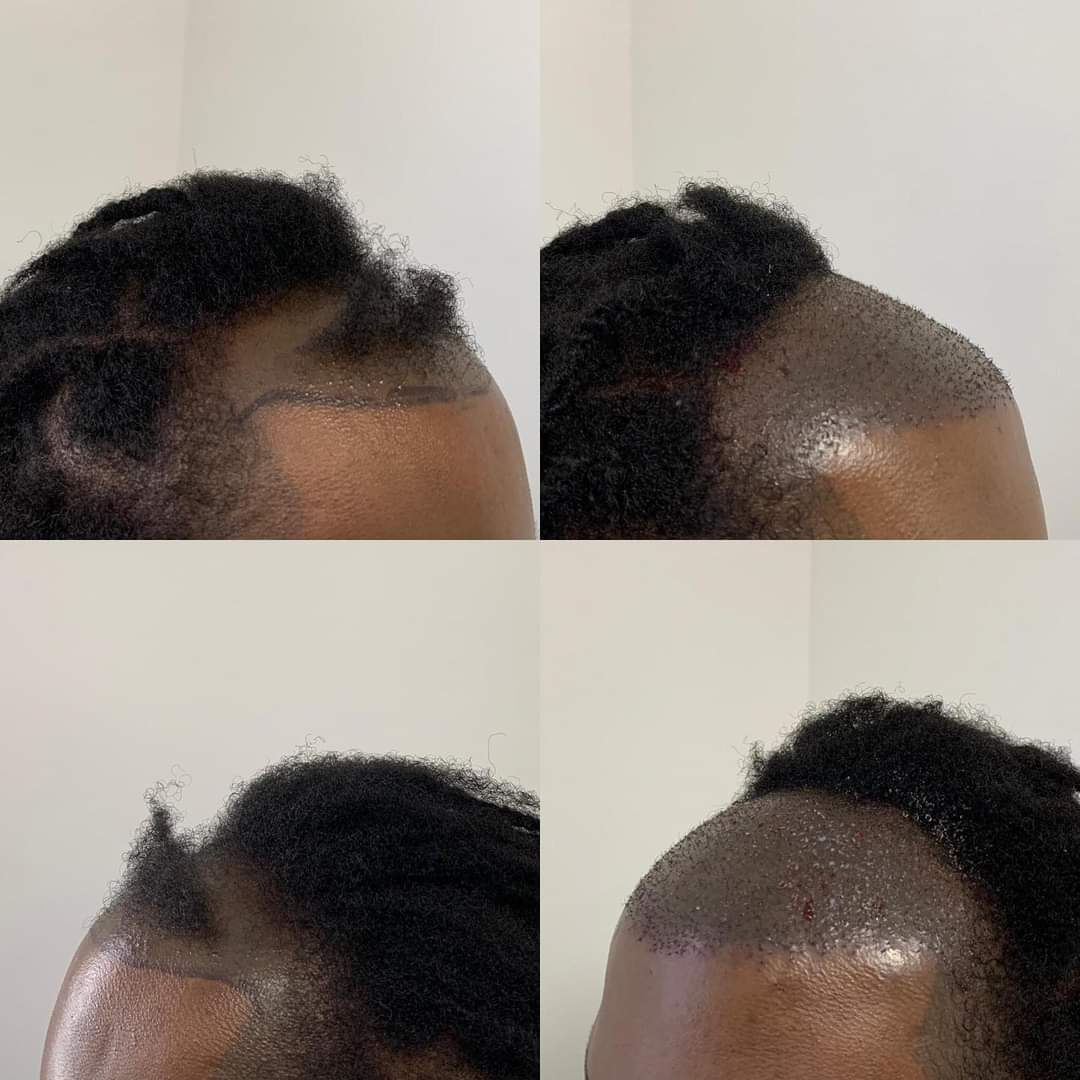Expert Cosmetics Since 2017
Choice of Five-Star Clinics
Friendly and Knowledgeable Team
Afro Hair Restoration
If we were to use the standard small FUE instruments to extract the hair, the follicles could be damaged and would not be suitable to be implanted to another area. If we were to use larger instruments instead, we are able to extract the follicles without damaging them, however this provides a greater risk of having scars on the back of the head. The curly nature of the hair and follicles means that the individual extraction is difficult and usually impossible to perform on Afro hair.
If the area that is balding/thinning is only a small area, an FUE extraction could work, however before this could be looked into you would need to book a consultation appointment. In addition to this, we can also perform a test to see if the individual FUE extraction could work without damaging any follicles or scarring the scalp.
Afro hair needs to be extracted with great amounts of precision and the method we use for this is the FUT or “strip” method. After extraction and preparation, we can then implant the follicles individually and place them in a manner that matches the existing angle of the hair.



Challenges/differences within this transplant procedure
Cultural sensitivity and a knowledge of both the physical and anatomical sides of the Afro hair follicles are crucial for a successful transplant. The procedure itself usually poses very distinct challenges for a transplant clinic:
- Firstly, the shape of the hairline is different and seems to be much straighter with a closed off frontotemporal outline than is seen in other ethnicities.
- Secondly and as mentioned above, the nature of the follicle can make the procedure very challenging to individually extract the follicles without damaging or destroying them.
- Thirdly, during follicle preparation the hair transplant clinic needs to have a highly skilled transplant surgeon but also needs to have skilled, qualified and experienced assistants. The combination of these will ensure that the correct tools and technology are utilised to separate and clean the follicles which in turn will make them suitable to be implanted.
- Finally, during the implantation process, the transplant surgeon needs to use both their technical and artistic skills to mark the area in which the hair follicles will be implanted. They need to consider exactly how close each hair will to any others due to the curly nature of the hair, but also need to ensure the use of the correct instrument/s to ensure that no big incisions are made which in turn will minimise the risk of scarring.
Because of these challenges and characteristics, this type of hair transplant needs more time to perform.
Benefits of the afro hair transplant procedure
Afro hair transplantation can be incredibly rewarding for men and women as the natural curliness of the hair will provide the impression of incredible hair density. This can be very beneficial following the transplant as the result will be much better than an equivalent transplant procedure for other hair types.
Aside from the challenges and difficulties that come with this type of transplant procedure, hair restoration for African-Caribbean hair can be equally successful as any other ethnicity, provided it is performed with the correct tools and a high level of expertise.
Challenges/differences within this transplant procedure
Cultural sensitivity and a knowledge of both the physical and anatomical sides of the Afro hair follicles are crucial for a successful transplant. The procedure itself usually poses very distinct challenges for a transplant clinic:
- Firstly, the shape of the hairline is different and seems to be much straighter with a closed off frontotemporal outline than is seen in other ethnicities.
- Secondly and as mentioned above, the nature of the follicle can make the procedure very challenging to individually extract the follicles without damaging or destroying them.
- Thirdly, during follicle preparation the hair transplant clinic needs to have a highly skilled transplant surgeon but also needs to have skilled, qualified and experienced assistants. The combination of these will ensure that the correct tools and technology are utilised to separate and clean the follicles which in turn will make them suitable to be implanted.
- Finally, during the implantation process, the transplant surgeon needs to use both their technical and artistic skills to mark the area in which the hair follicles will be implanted. They need to consider exactly how close each hair will to any others due to the curly nature of the hair, but also need to ensure the use of the correct instrument/s to ensure that no big incisions are made which in turn will minimise the risk of scarring.
Because of these challenges and characteristics, this type of hair transplant needs more time to perform.
Benefits of the afro hair transplant procedure

Speak to an expert today
Give us a call or fill in our easy to use online form and a member of our customer support team will be in touch with you at a time and date that works best for you.
Frequently Asked Questions
How is Afro hair transplant different from other hair transplants?
What are the common hair transplant methods for Afro hair?
Why is Afro and Caribbean hair considered different for transplant procedures?
Is there a risk of scarring in Afro hair transplants?
Can chemicals used for relaxing Afro hair affect the transplant procedure?
Or call our team to arrange your consultation today:
- 0800 772 0039
View our latest news
The Fascinating Evolution of Cosmetic Surgery: A Journey Through Time
When we think of cosmetic surgery today, the images that often come to mind are those of celebrities with perfectly chiseled features or individuals undergoing transformative procedures for a rejuvenated appearance. However, the art and science of altering the human...
Stay connected

